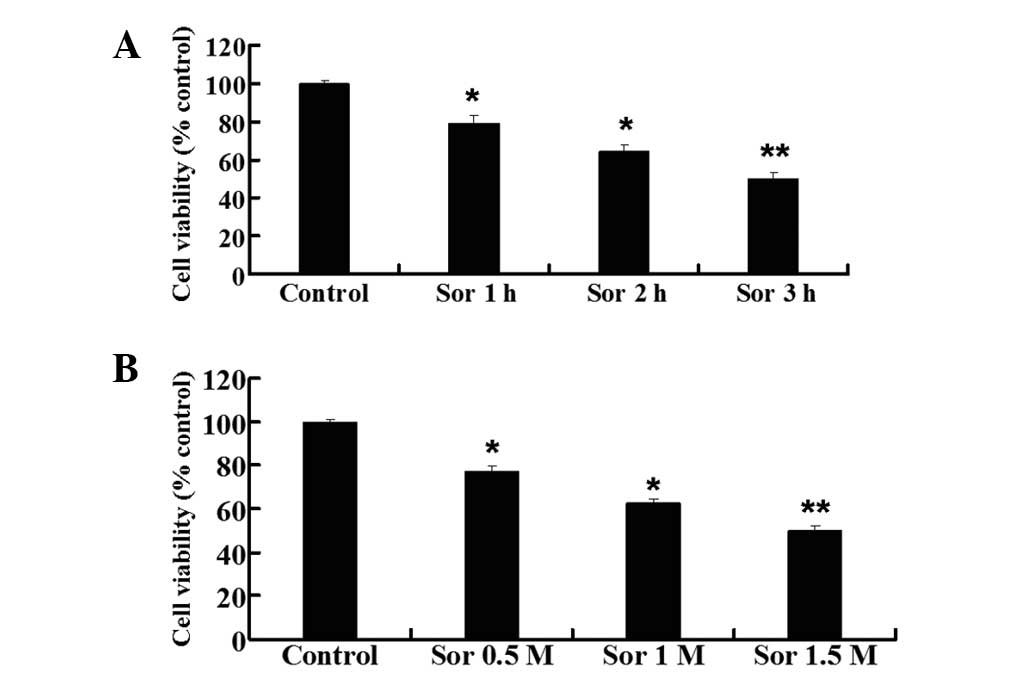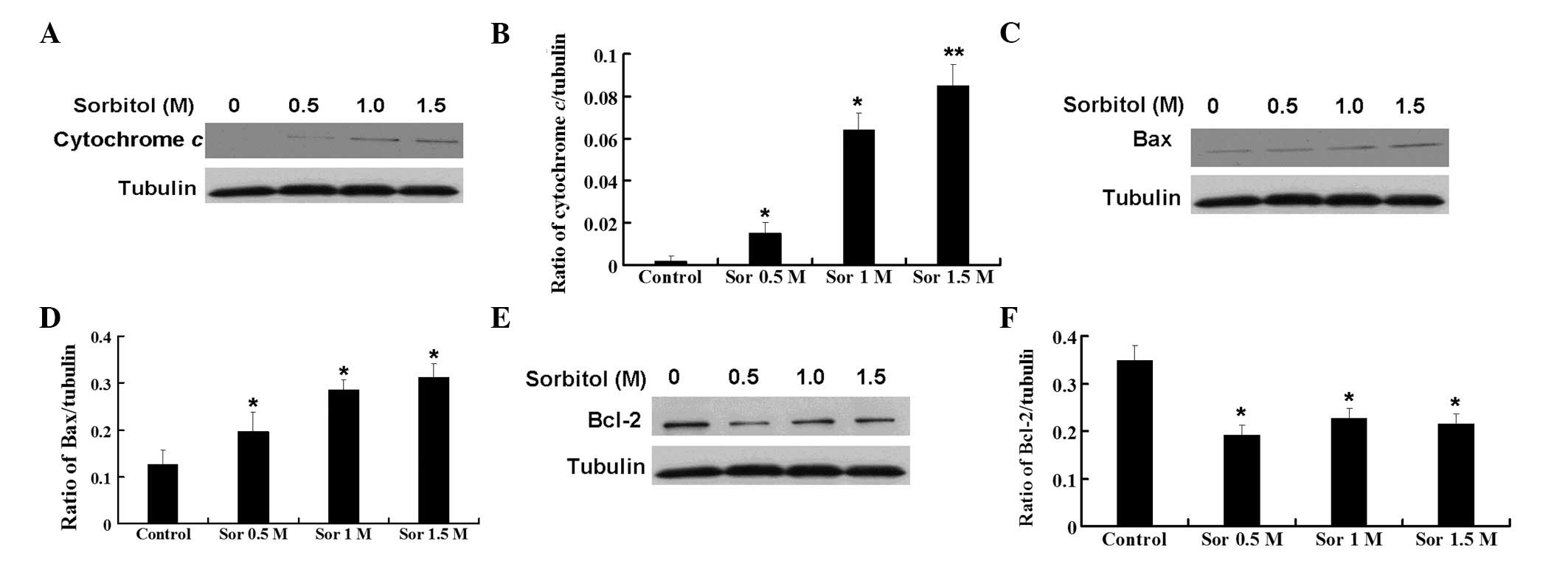|
1
|
Waldner M, Schimanski CC and Neurath MF:
Colon cancer and the immune system: the role of tumor invading T
cells. World J Gastroenterol. 12:7233–7238. 2006.PubMed/NCBI
|
|
2
|
Calvert PM and Frucht H: The genetics of
colorectal cancer. Ann Intern Med. 137:603–612. 2002. View Article : Google Scholar : PubMed/NCBI
|
|
3
|
Wang L, Xiao X, Li D, et al: Abnormal
expression of GADD45B in human colorectal carcinoma. J Transl Med.
10:2152012. View Article : Google Scholar : PubMed/NCBI
|
|
4
|
Liu SI, Huang CC, Huang CJ, et al:
Thimerosal-induced apoptosis in human SCM1 gastric cancer cells:
activation of p38 MAP kinase and caspase-3 pathways without
involvement of [Ca2+]i elevation. Toxicol Sci.
100:109–117. 2007.PubMed/NCBI
|
|
5
|
Rabi T and Banerjee S: Novel synthetic
triterpenoid methyl 25-hydroxy-3-oxoolean-12-en-28-oate induces
apoptosis through JNK and p38 MAPK pathways in human breast
adenocarcinoma MCF-7 cells. Mol Carcinog. 47:415–423. 2008.
View Article : Google Scholar : PubMed/NCBI
|
|
6
|
Park SJ and Kim IS: The role of p38 MAPK
activation in auranofin-induced apoptosis of human promyelocytic
leukaemia HL-60 cells. Br J Pharmacol. 146:506–513. 2005.
View Article : Google Scholar : PubMed/NCBI
|
|
7
|
Zhan Y, Gong K, Chen C, et al: P38 MAP
kinase functions as a switch in MS-275-induced reactive oxygen
species-dependent autophagy and apoptosis in human colon cancer
cells. Free Radic Biol Med. 53:532–543. 2012. View Article : Google Scholar : PubMed/NCBI
|
|
8
|
Garmyn M, Mammone T, Pupe A, et al: Human
keratinocytes respond to osmotic stress by p38 map kinase regulated
induction of HSP70 and HSP27. J Invest Dermatol. 117:1290–1295.
2001. View Article : Google Scholar : PubMed/NCBI
|
|
9
|
Stadheim TA and Kucera GL: c-Jun
N-terminal kinase/stress-activated protein kinase (JNK/SAPK) is
required for mitoxantrone- and anisomycin-induced apoptosis in
HL-60 cells. Leuk Res. 26:55–65. 2002. View Article : Google Scholar : PubMed/NCBI
|
|
10
|
Stadheim TA, Saluta GR and Kucera GL: Role
of c-Jun N-terminal kinase/p38 stress signaling in
1-beta-D-arabinofuranosylcytosine-induced apoptosis. Biochem
Pharmacol. 59:407–418. 2000. View Article : Google Scholar : PubMed/NCBI
|
|
11
|
Ribatti D and Vacca A: The role of
microenvironment in tumor angiogenesis. Genes Nutr. 3:29–34. 2008.
View Article : Google Scholar
|
|
12
|
Zhao P, Zhong W, Ying X, et al: Manganese
chloride-induced G0/G1 and S phase arrest in A549 cells.
Toxicology. 250:39–46. 2008. View Article : Google Scholar : PubMed/NCBI
|
|
13
|
Johansson M and Persson JL: Cancer
therapy: targeting cell cycle regulators. Anticancer Agents Med
Chem. 8:723–731. 2008. View Article : Google Scholar : PubMed/NCBI
|
|
14
|
Lee SK, Kim HN, Kang YR, et al: Obovatol
inhibits colorectal cancer growth by inhibiting tumor cell
proliferation and inducing apoptosis. Bioorg Med Chem.
16:8397–8402. 2008. View Article : Google Scholar : PubMed/NCBI
|
|
15
|
Salvesen GS and Riedl SJ: Caspase
mechanisms. Adv Exp Med Biol. 615:13–23. 2008. View Article : Google Scholar : PubMed/NCBI
|
|
16
|
Liu XD, Fan RF, Zhang Y, et al:
Down-regulation of telomerase activity and activation of caspase-3
are responsible for tanshinone I-induced apoptosis in monocyte
leukemia cells in vitro. Int J Mol Sci. 11:2267–2280. 2010.
View Article : Google Scholar : PubMed/NCBI
|
|
17
|
Sun KW, Ma YY, Guan TP, et al: Oridonin
induces apoptosis in gastric cancer through Apaf-1, cytochrome c
and caspase-3 signaling pathway. World J Gastroenterol.
18:7166–7174. 2012. View Article : Google Scholar : PubMed/NCBI
|
|
18
|
Reed JC, Miyashita T, Takayama S, et al:
BCL-2 family proteins: regulators of cell death involved in the
pathogenesis of cancer and resistance to therapy. J Cell Biochem.
60:23–32. 1996. View Article : Google Scholar : PubMed/NCBI
|
|
19
|
Chao DT and Korsmeyer SJ: BCL-2 family:
regulators of cell death. Annu Rev Immunol. 16:395–419. 1998.
View Article : Google Scholar
|
|
20
|
Lee JC, Kumar S, Griswold DE, et al:
Inhibition of p38 MAP kinase as a therapeutic strategy.
Immunopharmacology. 47:185–201. 2000. View Article : Google Scholar : PubMed/NCBI
|
|
21
|
Ichijo H, Nishida E, Irie K, et al:
Induction of apoptosis by ASK1, a mammalian MAPKKK that activates
SAPK/JNK and p38MAPK signaling pathways. Science. 275:90–94. 1997.
View Article : Google Scholar : PubMed/NCBI
|
|
22
|
Hui L, Bakiri L, Stepniak E and Wagner EF:
p38alpha: a suppressor of cell proliferation and tumorigenesis.
Cell Cycle. 6:2429–2433. 2007. View Article : Google Scholar : PubMed/NCBI
|
|
23
|
Chiacchiera F and Simone C:
Signal-dependent regulation of gene expression as a target for
cancer treatment: inhibiting p38alpha in colorectal tumors. Cancer
Lett. 265:16–26. 2008. View Article : Google Scholar : PubMed/NCBI
|
|
24
|
Bradham C and McClay DR: p38 MAPK in
development and cancer. Cell Cycle. 5:824–828. 2006. View Article : Google Scholar : PubMed/NCBI
|
|
25
|
Van Laethem A, Van Kelst S, Lippens S, et
al: Activation of p38 MAPK is required for Bax translocation to
mitochondria, cytochrome c release and apoptosis induced by UVB
irradiation in human keratinocytes. FASEB J. 18:1946–1948.
2004.PubMed/NCBI
|
|
26
|
Mandal C, Dutta A, Mallick A, et al:
Withaferin A induces apoptosis by activating p38 mitogen-activated
kinase signaling cascade in leukemic cells of lymphoid and myeloid
origin through mitochondrial death cascade. Apoptosis.
13:1450–1464. 2008. View Article : Google Scholar
|


















